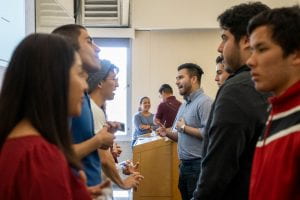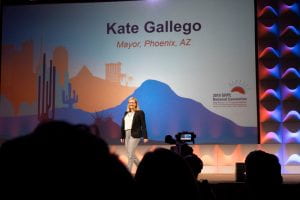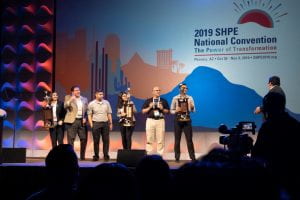
We are hiring! There are multiple tenure-track faculty positions now available with the Computer Science, Data Science, and Engineering programs.
Find the job ads, application requirements, and deadlines at:
The University of San Francisco’s (USF) Women in Tech initiative is thrilled to announce an incredibly generous $300,000 gift from Craig Newmark, the founder of Craigslist and Craig Newmark Philanthropies. This extraordinary gift is a continuation of Newmark’s longstanding commitment to supporting gender equality in technology. His goal is to help more women become interested in coding early on in their educational careers and to aid in the fostering of an inclusive environment for all women in tech.
Craig Newmark’s donation will directly impact six areas across Computer Science, Data Science, and Engineering for both undergraduate and graduate students at USF. These are:
The Department of Computer Science welcomed their first cohort of Community-Engaged Scholars (CES) this past fall semester. CES is funded through the National Science Foundation and is a four-year scholarship program designed to support academically talented, low-income students.
The program started with a one-week, residential summer program. Students participated in day-long sessions with faculty and guest lecturers, were introduced to foundational topics in CS, campus and departmental resources, and the resources available from the technical community in the SF Bay area. Students also had the opportunity to explore San Francisco through field trips.
The program continued in the fall semester with a seminar taught by Professor Sophie Engle. This course featured activities including faculty research talks; presentations by the campus career center and similar organizations; field trips to local meetup events; and opportunities for the scholars to socialize and build relationships with one another.
To learn more about the program, visit https://scholars.cs.usfca.edu/.
Professor Haden Lee has been an amazing addition to the Department of Computer Science. In his first semester, he taught a graduate-level Algorithms course and he has now transitioned to teaching a graduate-level Data Processing in the Cloud course. We sat down with him to discuss how his first semester went, how his second semester is going and touched on his future goals.
“I learned a lot of new things in terms of how students organize”
Before Professor Lee joined USF, he noted that his goal was to learn and contribute to the student body as a whole. This first semester was a learning experience for him, especially during CS Night, our yearly student project showcase. Professor Lee spent the night exploring projects and thinking about how he could possibly be a faculty sponsor for a project in the future. He enjoyed all of the excitement and projects that students have come up with that displayed their own strengths as programmers and creativity.
Professor Lee was not only a spectator but an active participant of CS Night. He was part of a panel that shared career insights with students after the student showcase and answered questions from the audience about how to get an internship along with post-graduation advice for Computer Science Majors.
Something that Professor Lee would like to see in the future in the department is to modernize the Computer Science Labs space and equipment for classes and projects. His Data Processing course is very programming heavy and is broken down into two sections. The first is running programs on your local machine, with the course transitioning to the cloud with Google Cloud Platform. Professor Lee says that it would be nice to be able to use the CS labs so you could run computationally intense programs in the Computer Lab which would reduce latency from testing to verifying your project output.
“Giving students relevant advice is important to me”
Professor Lee also gives students the option to have 1-on-1 time with him to talk about anything that they would like. He says that 80% of students take him up on the offer and a common thread is about their resume. Professor Lee stresses the importance of getting help from people with relevant industry experience because, in a fast-moving field like software engineering, it is important to stay current and up to date. He looks forward to finding a solution to help other students in a scalable way.
Professor Sophie Engle wrote a short essay on imposter syndrome for the upcoming CRASE special issue on identity.
You can read it here https://repository.usfca.edu/jips/vol2/iss1/7/
Last semester, I was fortunate enough to attend the 2019 National SHPE Convention that was held over Halloween Weekend in Phoenix Arizona. SHPE is the Society of Hispanic Professional Engineers, and its yearly national convention is the biggest gathering of Hispanic students and professionals in North America. The weekend holds workshops, parties, a stadium filled with employers and recruiters, and more parties.

Before transferring to USF, I attended San Jose State University and saw the large community of Hispanic engineers that got together for club meetings, recruiter run resume workshops, and field trips. At USF I became involved in Diversineers (shoutout to Ornelle) which was the closest thing to SHPE. Still wanting to connect with Hispanic people in the engineering filed, I looked to the professional SF Bay Area SHPE chapter which holds various events all over the bay where students are welcome.

I was so excited to have found a community of people that were in a similar position that I was in and was convinced that USF would benefit from having a chapter. Diversineers and SHPE SF Bay Area chapter teamed up to put on a day of mentorship, dubbed mentorSHPE, that taught students and professionals tools to become a better mentor/mentee. Students from San Francisco State University, Napa Valley College and many more were at attendance at the event alongside engineering professionals from all disciplines. This may seem like a detour to my experience at the SHPE national convention, but the students and professionals that came to USF welcomed me with open arms in at Nationals.


The moment I landed in Phoenix it was energy overload. This was my first conference and I had no idea what to expect or how to prepare. While getting my badge people were already signing up for events, hackathons, competitions and more. I received a bag full of goodies and a paper map that spanned the length of a table with every location and schedule of events. From there, I met Juan Hernandez, a guy that went to a neighboring high school and used to work across the street from me. He is now studying Mechanical Engineering at Cal Poly SLO and I hung out with him for the night. We went over to McDonald’s and got our costume for the Halloween parties at the local dollar store. While hanging out with Juan, he told me what to look out for at Nationals and how to best navigate the convention.

The following day was when all of the workshops began. I met back up with Juan, but our different interests in engineering ended taking us to different workshops and socials. I attended workshops on resume creation and development, how to best present yourself to recruiters, and entrepreneurship for engineers.
A workshop that stood out was the “What Drives Us” workshop hosted by Inter, Uber, and Broadcom Professionals. They shared how they began at SHPE during their college years and how they affect their workplace by way of effective leadership.


After all of the main talks were over, there were “Hospitality Suites” sponsored by companies where recruiters would casually network with people a day before the career fair. There were 2 hour waits to get into a lunch hospitality suite, with similar wait times happening for dinner Hospitality Suites. I saw Delia from the Delta Valley Professional Chapter and chatted with her after lunch. We attended a few workshops together and then it was time to line up for the evening “Hospitality Suites”. Delia was very keen on getting into the Johnson & Johnson suite and decided to part ways. I attended 15+ smaller suites that startups held and returned after 4 hours to see how the J&J line was doing. In that time Delia literally did not move and we joked about her being able to even get into the suite. After I attended 15 more hospitality suites, I returned to Johnson & Johnson and saw that there was no line. With 10 minutes left before all the suites closed, I charmed my way into the suite and found Delia finally talking to a recruiter. She saw me out of the corner of her eye and smiled. Afterward, we left laughing and joking about J&J line.

Towards the end of the evening, the Welcome Keynote took place where Phoenix mayor welcomed everyone to the city. She encouraged us to enjoy our time in the city and to fall in love while in Phoenix (which I found quite strange, but I am not complaining). There I met some people from the University of Rochester, a dream school for me because they have one of the top-rated music programs in the country. There they told me about how they never went over to Eastman which I found amusing.

Sponsors were highlighted along with regional awards. It didn’t really hit me until I saw all the logos on the screen, but the diversity in companies that were in attendance was far greater than I imagined. At USF, we only have a Computer Science Department, with Data Science and Biology being off on their own, as opposed to other schools having a unified engineering department that houses STEM programs together. Biotech, Mechanical Engineering, Materials, Civil, all had equal, if not greater representation at the conference than the usual Bay Area Software Engineering.


I happened to run into the San Francisco State people that attended the USF mentorSHPE workshop a few months back. I was great catching up with them and they invited me to tag along to a birthday gathering, where the Napa Valley College people were in attendance. After dinner, I went out with the Napa Valley College leadership and stayed up all night to party at the neighboring bars and clubs. At some point, I was in a swanky restaurant where I was served free food and drinks and ended up getting my resume reviewed by a group of engineers/recruiters at the restaurant which was quite a trip because everyone was so helpful in refining my resume before the career fair. I applied what I learned that night and refined my until the following day.

On my final day, everyone had a look of exhaustion. Everyone has had a few late nights in a row and waking up early did not help. There was an epic line that zigzagged from one auditorium to another and finally into the main stadium where the career fair was being held. From there I stood in the queue for a few hours. At one point, people got desperate and broke a section of a barrier that was holding the lines in the snakelike shape ended up being a blob of people trying to get into the next auditorium.

I finally was inside the stadium where all of the recruiters were in their respective booths and I talked to recruiters from companies such as Twitter and Unity to new companies that I caught my attention. One of them was Denso which is an auto manufacturing company. I ended up having a few onsite interviews which was exciting because I actually got to go into a booth and speak with engineers and Program/Project managers directly. They asked me about my projects (shout out to Professor Engle and her Search Engine Project) and talk about my interest in the Software Engineering field.
In the end, I had an amazing time at SHPE National Conference. It is one of the defining moments of my time as a student that I will reflect on for the rest of my life. I have made lifelong friends and encourage anyone thinking about attending a conference to do so. A few tips that I would like to give to future students:
I’d like to give special thanks to Diversineers advisor Prof. David Guy Brizan and Rosa Maria Garay for helping me organize the initial mentorSHPE event that took place at USF, I would have not gone to Nationals without your help.
Sope Ogundipe is a second year MS in Computer Science student graduating this spring 2020.
Sope came into the program from the University of Lagos with a Bachelor of Science in Systems Engineering. Over the summer he was a Software Engineering Intern at Arista Networks in San Francisco. In addition to his internship, he was a Code2040 fellow. He learned a lot of lessons about work and life in general during that summer. lessons that he hopes will take with him for the rest of his life. When asked what he learned during his summer internship he gave great insights into what he learned.
Code Style & New Tools:
I learned about writing proper code that followed the style guidelines for Golang and Python. I remember there were so many corrections during my first code review, but they got better over time. I also learned how to use Gerrit for code reviews and Jenkins for testing, while gaining more experience using git for some more complex functions than just pushing and pulling.
Reading and debugging code:
It’s much harder to practice DRY when your codebase contains over a thousand go files. I had to check for duplicates before implementing any helper function; because chances are such a function already existed. I enjoyed debugging code during my time in Arista. One particular scenario that stands out is when I had to debug an open-source library named “goxpath” to figure out an issue with wrong values being populated in AST trees. It took about two days of diagramming and writing out functions on a whiteboard while stepping through an unfamiliar codebase but I eventually fixed it and made a pull request. It was exhilarating 🙂
Network-related concepts:
Arista is a Network company, so I learned a lot about network concepts through my work and even just by being around and having conversations with people. Arista also had routine tech talks which helped a lot with this.
When reflecting on how his education at USF contributed to getting and excelling in his internship he stated:
A bunch of classes I’d taken up until when I started my internship really helped me both secure my internship and excel in it. “Principles of software development” instilled in me the virtue to write quality code and think about performance and scalability from the outset. “Algorithms” was sure useful (I had to implement an algorithm that checked if two trees are equal as part of a test case I designed). The Blockchain course introduced me to Golang which happened to be the major programming language used by my team in Arista.
Professor Vahab Pournaghshband’s article “Promoting Diversity-Inclusive Computer Science Pedagogies: A Multidimensional Perspective,” was recently accepted to ACM ITICSE2020. Learn more about Professor Vahab’s research here:
Click to view a PDF: Vahab ITICSE_20_Paper
This year, USF attended the ACM Richard Tapia Celebration of Diversity in Computing in San Diego. USF Computer Science undergraduate and graduate students were able to network with other students and professionals from around the country and experience diversity in technology by way of informative speaker series and career fair. Shared experiences like these take USF education beyond the classroom and into the real world, where new longlasting professional relationships are formed and further developed.
We asked students who attended to share their experience with us:
What was your main motivation for attending Tapia? What goals did you set, and did you achieve them?
I wanted to attend Tapia so that I would be able to be part of a community that accepted and allowed diversity and did the promotion of uplifting these communities. I also wanted to have access to a lot of companies so that I can discuss and learn more about the whole internship process.
How was your experience at the Tapia Conference? What stood out and why?
Tapia Conference was a nice experience. It was refreshing to see so many people from diverse backgrounds. I liked how people were friendly and willing to engage other attendees they’d only just met – that was true for the students, recruiters, and every other attendee including the keynote speakers. I also liked that there were various opportunities to connect with people not just at the conference center but at different events organized by attending companies.
The MAGICS lab (Machine Learning, AI, Gaming Intelligence, and Computing at Scale) is focused broadly on research in machine learning, deep learning, AI, natural language processing and big data. The lab’s objective is to convene a group of students and faculty with complementary skills who are interested in learning about and solving broad, data-focused problems through the use of contemporary and cutting-edge algorithms and computational techniques. Both newcomers to the field and seasoned veterans alike are encouraged to join our weekly meetings, which include research presentations as well as tutorials on the latest tools and libraries in ML, AI, and big data. Continue reading “Meet the MAGICS with Professors Matthew Malensek and David Guy Brizan”